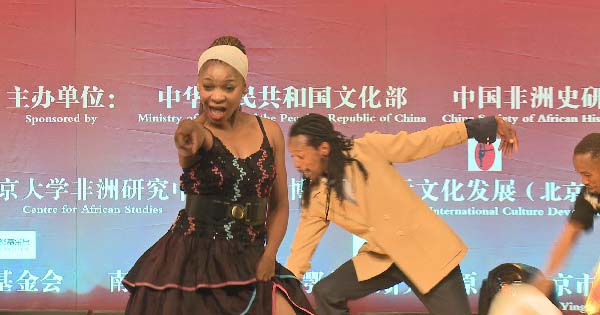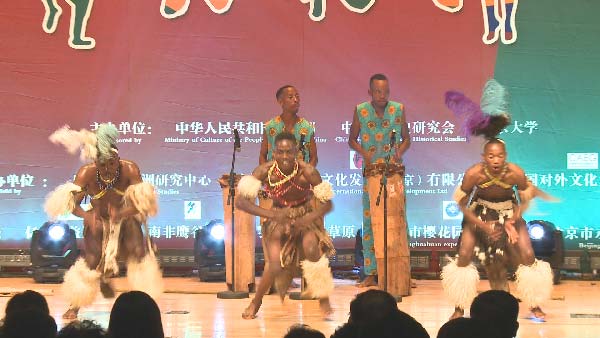Full coverage: Special Program
By CCTV.com reporter Shen Jie
Simunye Afrika, a Zulu dance troupe, visited China and performed the traditional African dance to a Chinese audience last week at Beijing University.
The troupe was founded by South African couple Richard and Marlene Mackridge, who have been promoting African music and dances for 26 years.

Simunye Afrika, a Zulu dance troupe, visited China and performed the traditional African dance to a Chinese audience last week at Beijing University.

Simunye Afrika, a Zulu dance troupe, visited China and performed the traditional African dance to a Chinese audience last week at Beijing University.
Richard Mackridge, director of the troupe, said: "Zulu dance is the only traditional African dance, Zulu dance is the most powerful dance because it represents the dances from the wood, the bush. When they were fighting, it's a very strong and strong dance, and it carried a message into the people what they do."
Richard said all the dancers come from the African bush and that is how they learned to dance in a traditional way and show the natural African dance.
Richard added: "African music is beat, beat, boom boom, drums, drums. That's Africa, and the dancing is very vibrating, very energetic."
Han Zhihong, director of Division of African Affairs, Bureau for External Cultural Relations, Ministry of Culture, commented that drums are beat loudly and there are various fast-paced dance moves. She said that what is most important is that all the dancers performed with passion, tried their best and always had smiles on their faces, which is very appealing, showing their enthusiasm for art and culture.
"I think we can learn a great deal from African culture in terms of the harmonious relationship between human beings and nature and also the strong sense of communities," said Li Anshan, chairman of Chinese Society of African Historical Studies.
Qin Wenhuan, vice president of China Performing Arts Agency, told CNTV that Simunye Afrika came to Beijing to participate in the "Meet Beijing Festival," which includes a variety of art forms, such as opera, dances and music. "All the five continents have sent their art groups for this. I think we need multilateral culture, not only the culture from some giant powers in the world, but also arts from developing countries," Qin said.
Li also mentioned the importance of people-to-people contact, adding that a lot of Chinese art groups also went to Africa. He said this kind of exchange will strengthen the cooperation between both sides and promote mutual understanding between both sides.
Han Zhihong explained how the China-African cultural exchanges have developed in recent years. She said the Ministry of Culture has been engaging in Sino-African culture spotlight activities. In odd years, there is a Chinese culture festival in Africa, while even years see an African culture festival held in China, so 2016 witnessed the African culture spotlight in China. Han emphasized that this kind of culture exchange will promote the mutual understanding between China and Africa and she expects more creative programs to further it.















